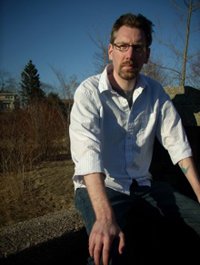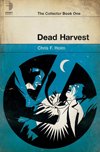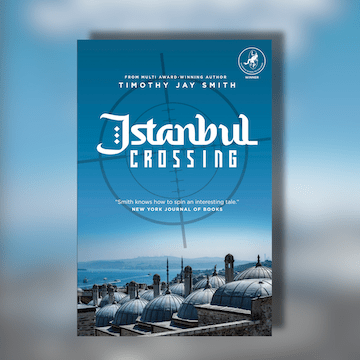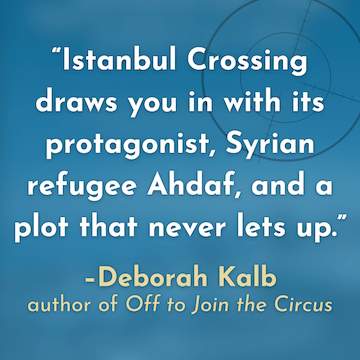
 Chris F Holm is a favourite here at Crime Fiction Lover. His collection of short stories, 8 Pounds, was mentioned in our feature article on the best short crime story collections, and reviewed in detail as well. So it was fantastic for me to have a conversation with him about his writing as well as his forthcoming novel, Dead Harvest.
Chris F Holm is a favourite here at Crime Fiction Lover. His collection of short stories, 8 Pounds, was mentioned in our feature article on the best short crime story collections, and reviewed in detail as well. So it was fantastic for me to have a conversation with him about his writing as well as his forthcoming novel, Dead Harvest.
Can you tell us a bit about why you write crime fiction?
I’ve been a fan of crime fiction since long before I’d ever heard the label. I’m from a family of voracious readers, none more so than my grandfather. He was a cop – rising through the ranks from beat cop to deputy chief – and he went through mystery novels like he went through cigarettes, which is to say by the carton. And his enthusiasm for them was infectious. As a kid, my family passed around crime novels by the grocery bag, swapping every Sunday dinner, which was heaven for a kid like me who went through five books a week. So to some extent, mysteries have always been the lens through which I viewed the world.
That said, I didn’t think of myself as a crime writer until I first put pen to paper. What really fascinates me is character. The problem is, well-behaved characters are dull. We’re all raised to behave to societal norms, so when we do so, it speaks little of who we really are. If you want to know what someone’s really made of, you’ve got to strip all that away. Crime is by nature transgressive, and as such it affords a truer glimpse into the hearts and minds of those who commit it than damn near anything else I can think of.
Of course, there’s a chance that answer’s nothing but a load of crap. Fact is, whatever I write – be it crime fic, fantasy, horror, or sci fi – has to have, at its core, a mystery, because otherwise I have no idea where the story begins or ends. Seriously, I don’t know how the literary folks decide where The End goes. And given some of the literary fiction I’ve read I’d humbly submit that some of them don’t have the greatest handle on it either!
I’ve always been taken with your ability to transport the reader to the places in your stories. How do you go about creating these rich settings?
Thank you – that’s very kind of you to say. I suppose the answer for that is twofold.
First, I view setting not as a backdrop on which to project the story, but as a character in its own right. All good stories may be rooted in character but to me all good characters are rooted in setting. Simply put, where we’re from shapes who we are.
Second, I tend to write places I have a personal connection with. The World Behind, for example, takes place in central Virginia, where my wife and I lived after college, and the story is very much rooted in my impressions of the place. I grew up in rural, upstate New York, a place where country’s not a synonym of quaint so much as desperate, a fact reflected in stories like Seven Days of Rain and A Better Life. And The Big Score takes place on a lobster boat thanks to a job I had for 10 years in a building that overlooked a working fish pier in Portland, Maine. I’d like to think that personal connection pays off on the page. It sure as hell makes the research easier.
 Can you tell us a bit about your upcoming novel?
Can you tell us a bit about your upcoming novel?
Dead Harvest is the first in a series of supernatural thrillers that recast the battle between heaven and hell as a Golden Era crime pulp. Picture angels driving Crown Vics and demons running speakeasies, and you’ve got the gist. The story centers around Sam Thornton, a man condemned by a devil’s bargain to deliver corrupted souls to hell for all eternity. Sam’s dispatched to collect the soul of a young girl accused of murdering her family, but he comes to believe the girl has been set up. Against orders from his superiors, he sets out to prove her innocence, and discovers along the way they’re both puppets in a plot to jump-start the End Times. Oh, and provided Sam survives Dead Harvest, the sequel, The Wrong Goodbye, is scheduled for release the following winter.
How did you come up with the concept?
Dead Harvest began as a scene playing through my head as I lay in bed, drifting off to sleep. A man, loitering outside an English pub in the dead of night, watching the merriment inside through panes of leaded glass. He was American, I realised, for in my head his thoughts narrated the scene and he was waiting, grumpy and impatient, for his target to emerge.
Now, maybe most folks don’t drift off to sleep with scenes of violence and mayhem running through their heads, but for me, it’s not uncommon. And once I realised the American meant the man he was watching through the window ill, I thought I had a handle on the kind of story that was playing out. I figured the guy for a hit man, maybe, or some kind of hired goon.
Though the scene was compelling, I didn’t feel there was enough to it to leap out of bed and jot it down, so instead I let it play. The pub closed. The target stumbled out into the street, and the American followed. The target stopped in an alley to take a leak, and the American ducked in after him. Then the American ripped out his target’s soul and left behind a twitching corpse. All the sudden I realised I’d been wrong. This story played out nothing like I expected it to. That’s when I leapt out of bed, ran to my desk, and got down as much of the scene as I could remember. In the week that followed I obsessed over that scene. Who were these people? What brought them to that point? Every time I asked a question, the answer revealed itself as if by magic. In that respect, I feel as though Dead Harvest wasn’t written so much as unearthed.
This interview was done by R Thomas Brown who runs the Criminal Thoughts blog; you can also check out Chris F Holm’s website here. Dead Harvest comes out in March 2011 in paperback from Angry Robot Books. Guarantee your copy by pre-ordering below.









Great stuff. Marvelous writer. Good to see him getting well deserved success.
Your books sound all kinds of badass.
Y’all (Ron included) are way too kind. Thanks.